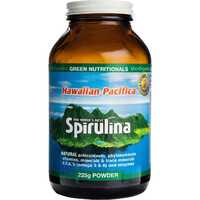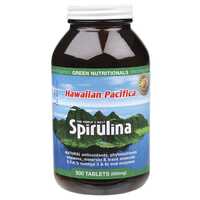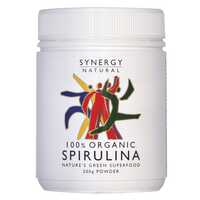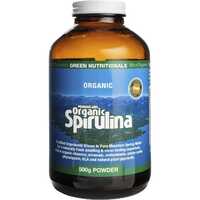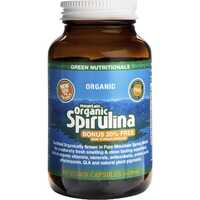Spirulina powder, derived from a type of algae that thrives in both fresh and saltwater, stands out as the ultimate superfood that you should be incorporating into your diet. Recognized for its dense concentration of nutrients and antioxidants, this cyanobacteria, also known as blue-green algae, has captivated health enthusiasts globally[1][2]. Its historical consumption by the Aztecs and the interest shown by NASA for its potential as space food underline its value and versatility[1][5]. Moreover, the fact that it is considered Generally Recognized as Safe (GRAS) by the US Food and Drug Administration reinforces its credibility and safety for consumption[2].
As the article unfolds, it will delve into the profound nutritional profile of spirulina powder, highlighting its rich content of vitamins, amino acids, and chlorophyll, which contribute to its myriad of health benefits[1]. From its potential in aiding weight loss to its significance as a gluten-free protein source, the discussions will extend to how spirulina powder can serve as a potent supplement for enhancing skin and hair health, as well as its historical and modern applications for bolstering human well-being[3][4][5].
What Is Spirulina?
Spirulina, a microscopic filamentous aquatic cyanobacterium, falls under the genus Spirulina or species S. platensis, also known by its scientific name Arthrospira platensis [8]. It's a type of biomass from cyanobacteria, commonly referred to as blue-green algae, that is safe for consumption by both humans and animals [9]. This superfood thrives best in environments with a pH around 8.5 or higher and temperatures around 30 °C (86 °F), typically found in the alkaline lakes of Mexico and Africa [9][10].
Nutritional Profile:
- High in protein and contains all nine essential amino acids [6].
- Rich in vitamins B, C, and E, alongside minerals such as iron and calcium.
- Known for its antioxidants like phycocyanin, which fight oxidative stress and offer anti-inflammatory effects [1].
Forms and Uses:
- Available in tablets, fine powder, flakes, and pills or capsules [14].
- Can be consumed directly or added to food for its nutritional benefits [10].
- Used historically by the Aztecs and in the Lake Chad area for its dense nutrient content [11].
Spirulina's unique structure, lacking cellulose cell walls, makes it easily digestible, allowing for the body to efficiently absorb its nutrients and antioxidants [2]. These properties not only boost nutrient levels in the body but also offer protection against various diseases [1]. However, it's important to note that spirulina can be contaminated with heavy metals, toxins, or other pollutants, thus consulting a healthcare provider before taking supplements is advised [11].
Nutritional Benefits of Spirulina
Spirulina powder is celebrated for its remarkable nutritional profile, offering a wealth of benefits that can enhance overall health and well-being. Its composition includes a comprehensive range of proteins, vitamins, minerals, and antioxidants, making it an exceptional superfood. Here's a closer look at the nutritional benefits of spirulina:
- Protein and Essential Amino Acids: Spirulina is an excellent source of high-quality protein, containing all essential amino acids required by the body. This makes it a valuable protein source, especially for vegans and vegetarians. With a protein content of about 60%, spirulina surpasses most vegetables in protein density, providing 4 grams of protein per tablespoon [4][5][23].
- Vitamins and Minerals: Spirulina is rich in a variety of vitamins and minerals that are crucial for maintaining good health. It contains significant levels of vitamins A, B1 (thiamine), B2 (riboflavin), B3 (niacin), C, and E, as well as minerals like iron, magnesium, potassium, copper, and zinc. One tablespoon of spirulina provides 14% of the Daily Value (DV) for thiamine, 20% of the DV for riboflavin, and 47% of the DV for copper, among other nutrients [1][2][5][13][19][22].
- Antioxidants and Anti-inflammatory Properties: Spirulina's antioxidants, such as beta-carotene, vitamin E, and the unique phycocyanin, play a significant role in neutralizing free radicals, thereby reducing inflammation and preventing cell damage. These antioxidants are also known for their potential in improving skin health, offering protection against UV rays, and boosting collagen production [1][13].
Additionally, spirulina has been shown to support metabolic health by promoting satiety, controlling appetite, and enhancing metabolism. Its low calorie and fat content, coupled with its high nutrient density, make it an ideal addition to a health-conscious diet. One tablespoon of spirulina contains only 20 calories and 1 gram of fat, yet it is packed with 4 grams of protein and a range of beneficial nutrients [5].
In summary, spirulina powder stands out as a superfood due to its dense nutritional content, offering a synergistic blend of protein, essential amino acids, vitamins, minerals, and antioxidants. These components contribute to its numerous health benefits, making spirulina a valuable addition to any diet.
Health Benefits of Incorporating Spirulina into Your Diet
Incorporating spirulina into your diet offers a multitude of health benefits, thanks to its rich nutritional profile. Here are some of the key health advantages:
Heart Health and Blood Lipids:
- Improves Blood Lipids: Spirulina has been shown to positively impact blood lipid levels, which is crucial for maintaining heart health [6].
- Lowers Cholesterol: Regular consumption can decrease cholesterol levels, improving overall metabolic health. Specifically, it helps lower total cholesterol, LDL (bad cholesterol), and triglycerides, while increasing HDL (good cholesterol) [1][13].
- Reduces Blood Pressure: Spirulina increases nitric oxide production in the body, which helps in reducing blood pressure [5].
Immune System and Anti-Cancer Properties:
- Boosts Immune Function: It strengthens the immune system and may stimulate natural killer cells, enhancing the body's ability to fight infections and potentially reducing the risk of cancer [13][14].
- Anti-Cancer: Spirulina exhibits anti-cancer properties by reducing inflammation, blocking tumor growth, and killing cancer cells [5][13].
Allergies and Inflammatory Conditions:
- Allergy Relief: It offers relief from allergies by reducing symptoms such as congestion, sneezing, and itching [5].
- Anti-Inflammatory: The antioxidative properties of spirulina help in reducing inflammation in the body, which can decrease the chances of various diseases [25].
Gut Health and Detoxification:
- Supports Gut Health: Spirulina may support gut health as people age, leading to better regulation of skin inflammation [24]. It also has antimicrobial and antibacterial properties, which contribute to a healthy gut environment [25].
- Detoxifies the Body: Spirulina is known for its detoxifying effects, particularly in eliminating toxins such as arsenic from the body.
Additional Benefits:
- Dental Health: Using spirulina-laced mouthwash has shown significant reductions in dental plaque and gingivitis [25].
- Skin and Muscle Health: Spirulina may improve skin health by improving gut health and has been shown to improve endurance and muscle strength [23][24].
While spirulina offers these health benefits, it's important to note that more high-quality studies are needed to recommend spirulina for specific health outcomes confidently. However, its current known benefits make it a valuable addition to a balanced diet [11].
Skin and Hair Benefits of Spirulina
Spirulina, a superfood known for its rich nutritional profile, also offers significant benefits for skin and hair health. Its properties not only protect and nourish but also enhance the appearance and health of both skin and hair. Here's how spirulina stands out as a beauty booster:
Skin Benefits
- Antioxidant Protection: Spirulina's antioxidant properties shield the skin from environmental damage, improving skin tone and reducing signs of aging. Its ability to fight free radicals helps maintain youthful and vibrant skin .
- Collagen Production: The proteins in spirulina stimulate collagen production, crucial for skin elasticity and firmness. By decreasing the production of elastase, spirulina helps in reducing the formation of wrinkles and fine lines, contributing to smoother, firmer skin.
- Treatment for Skin Conditions: For those dealing with psoriasis, eczema, or fungal infections, spirulina can offer relief. Its antifungal properties and high levels of healthy fatty acids and antioxidants make it effective in treating these conditions, soothing irritated skin, and promoting healing.
Hair Benefits
- Promotes Hair Growth: Spirulina may increase growth factors in the cells of the scalp, contributing to healthier and faster hair growth. By nourishing the scalp and follicles, spirulina helps in achieving thicker, fuller hair [24].
- Moisturization and Scalp Health: The hygroscopic molecules in spirulina draw moisture from the environment, hydrating the scalp. Sugars, proteins, and amino acids in spirulina rebalance and soothe the scalp, supporting its barrier function and leading to healthier hair [27].
- Enhances Hair Appearance: Spirulina's antioxidant compounds contribute to stronger, glossier, and shinier hair. It can also help disguise gray or white hairs thanks to its high content of iron, amino acids, and pigments, offering a natural solution to maintaining hair color [27].
Incorporating spirulina into skincare and haircare routines can be done through supplements, powder forms, or products infused with spirulina, such as shampoos, conditioners, and hair masks. For direct scalp and hair treatment, blending spirulina into a hair oil and massaging it into the scalp and hair can provide nourishing benefits, leading to healthier, more vibrant skin and hair [27].
Spirulina and Weight Loss
Spirulina powder is increasingly recognized for its potential in aiding weight loss, thanks to its rich nutritional content and specific properties that target various aspects of metabolic health. Here's how spirulina can be a valuable addition to a weight management plan:
High Protein Content:
- Spirulina is exceptionally high in protein, which is known for its satiety-inducing properties. Protein helps keep you full for longer periods, thereby reducing overall calorie intake[28].
- The presence of all essential amino acids in spirulina supports muscle growth and repair, which is crucial for maintaining a healthy metabolism and aiding in weight loss[28].
Appetite Control:
- Contains phenylalanine, an amino acid that plays a pivotal role in appetite regulation. It stimulates the production of cholecystokinin, a hormone that signals fullness to the brain, helping in controlling appetite and reducing food intake[28].
- Its high fiber content also contributes to a feeling of fullness, slows down digestion, and helps in regulating blood sugar levels, preventing unnecessary cravings[28].
Metabolic Boost:
- Spirulina is loaded with antioxidants and nutrients that have a positive impact on the body's metabolic functions. These components can increase energy expenditure and enhance the body's ability to burn calories more efficiently[28].
- Supporting a healthy gut microbiome, spirulina aids in the absorption of essential nutrients that boost metabolism, promoting better energy utilization and contributing to healthy weight management[28].
Research underscores the effectiveness of spirulina supplementation in weight loss efforts. A review paper highlighted spirulina's benefits in reducing body fat, waist circumference, body mass index (BMI), and appetite[6]. Moreover, a pooled analysis revealed significant results in individuals receiving spirulina supplements:
Weight and Body Fat Reduction:
- Participants experienced an average weight reduction of 1.56 kg, showcasing spirulina's potential in contributing to weight loss[29].
- There was also a noticeable decrease in body fat percentage, with an average reduction of 1.02%, and waist circumference, which saw a 1.40 cm reduction[29].
These findings suggest that incorporating spirulina into one's diet, especially for obese individuals, can be an effective strategy for managing weight and improving body composition[29].
How to Use Spirulina Powder in Your Daily Routine
Incorporating spirulina powder into your daily routine can be both simple and versatile, offering a plethora of ways to enjoy its health benefits. Here are some creative and easy methods to get started:
Smoothies and Beverages
- Spirulina Smoothie: Combine 1 cup of your preferred liquid (water, juice, coconut water, or almond milk), 1 cup leafy greens, 1 cup frozen fruit, and 2 teaspoons of spirulina powder for a nutrient-packed smoothie[31].
- Morning Kickstart: Add spirulina powder to your morning juice or shake to provide a nutrient boost at the beginning of the day. Starting with 1g per day and gradually increasing up to 8g can enhance weight loss and lower BMI[28][31].
Culinary Uses
Creative Cooking:
- Spirulina Ice Cream: Blend coconut milk, cacao nibs, agave syrup, and spirulina for a refreshing and nutritious treat[30].
- Spirulina Guacamole: Enhance your guacamole by adding 2 teaspoons of spirulina per avocado, boosting its nutritional value[30].
- Spirulina Salad Dressing: Mix 1 teaspoon of spirulina powder with each tablespoon of olive oil for a unique and healthy salad dressing[30].
Baking and Snacks:
- Spirulina Power Cookies: Incorporate spirulina with superfoods like mulberries and goji berries for a nutritious snack[30].
- Energy Bites: Create energy bites using spirulina powder, nuts, figs, or hummus for a quick and nutritious snack[31].
Supplements and More
- Dietary Supplements: Spirulina can also be taken as a dietary supplement, with a daily intake of 2-8 grams being sufficient to reap its benefits[22][28].
- Quality Matters: To ensure the best quality and safety, opt for organic spirulina products that have been third-party tested for purity[31].
By integrating spirulina into your diet through these varied methods, you can easily take advantage of its numerous health benefits. Whether it's by starting your day with a spirulina-infused smoothie, experimenting with spirulina in your cooking, or simply taking it as a supplement, there are ample ways to incorporate this superfood into your daily routine[22][28][31].
Conclusion
Throughout the discourse, the immense value of spirulina powder as a superfood has been thoroughly explored, demonstrating its broad spectrum of benefits ranging from nutritional richness to its significant impact on health and well-being. The comprehensive dive into its nutritional profile reveals spirulina's role not only in promoting heart health, immune function, and metabolic health but also in its potential for weight management and the remarkable benefits it offers for skin and hair health. This dense nutritional powerhouse, backed by historical use and scientific research, stands as a testament to its potential in supporting and enhancing human health in multifaceted ways.
As we've delved into the versatile uses of spirulina, from dietary supplements to its integration into daily food items, it's clear that spirulina is not just beneficial for health but also adaptable to various lifestyle needs. The substantiated benefits, coupled with practical suggestions for its incorporation into the daily diet, underscore spirulina's accessibility and usability for a wide audience. Whether for nutritional supplementation, weight loss, or skin and hair care, spirulina presents a natural, nutrient-rich option worthy of consideration in the quest for a healthier and balanced lifestyle.
FAQs
What are the effects of daily consumption of spirulina?
Taking spirulina every day can lead to significant health benefits, primarily because its protein content can help decrease the absorption of cholesterol in the body. This reduction in cholesterol levels can prevent the clogging of arteries, thereby reducing the risk of heart disease and strokes. Additionally, spirulina's protein has been found to lower triglyceride levels, further contributing to heart health.
Who should avoid using spirulina?
Individuals diagnosed with autoimmune conditions such as multiple sclerosis, rheumatoid arthritis, or lupus are advised against consuming spirulina. The concern is that spirulina might activate the immune system further, potentially exacerbating these conditions.
What health advantages does spirulina superfood powder offer?
Spirulina superfood powder is celebrated for its wide range of health benefits, including:
- Enhancing heart health
- Promoting gut health
- Aiding in cholesterol management
- Supporting weight loss efforts
- Helping reduce blood pressure
- Increasing muscle strength
- Alleviating anemia
- Exhibiting potential anti-cancer properties
Are there any side effects associated with spirulina powder?
While spirulina is generally safe for consumption, it can sometimes be contaminated with harmful substances if grown in polluted water bodies. These contaminants may include heavy metals, bacteria, or microcystins, leading to possible side effects such as cramping, bloating, gassiness, diarrhea, dizziness, and vomiting.
References
[1] - https://www.healthline.com/nutrition/10-proven-benefits-of-spirulina
[2] - https://www.ncbi.nlm.nih.gov/pmc/articles/PMC3136577/
[3] - https://www.sciencedirect.com/topics/agricultural-and-biological-sciences/spirulina
[4] - https://www.health.harvard.edu/staying-healthy/by-the-way-doctor-is-spirulina-good-for-you
[5] - https://www.webmd.com/diet/spirulina-health-benefits
[6] - https://www.ncbi.nlm.nih.gov/pmc/articles/PMC7061888/
[8] - https://www.merriam-webster.com/dictionary/spirulina
[9] - https://en.wikipedia.org/wiki/Spirulina_(dietary_supplement)
[10] - https://dictionary.cambridge.org/us/dictionary/english/spirulina
[11] - https://www.verywellhealth.com/spirulina-89079
[12] - https://www.dictionary.com/browse/spirulina
[13] - https://www.health.com/spirulina-7497604
[14] - https://nutritionstripped.com/food-index/spirulina/
[19] - https://fdc.nal.usda.gov/fdc-app.html#/food-details/1064131/nutrients
[20] - https://fdc.nal.usda.gov/fdc-app.html#/food-details/170495/nutrients
[21] - https://www.ncbi.nlm.nih.gov/pmc/articles/PMC8997815/
[22] - https://www.medicalnewstoday.com/articles/324027
[23] - https://www.nutrasciencelabs.com/blog/spirulina-protein-nutritional-facts-benefits-and-market-trends
[24] - https://healthy-skin.me/3-benefits-of-spirulina-for-skin/
[25] - https://health.clevelandclinic.org/spirulina-superfood-youve-never-heard
[27] - https://www.byrdie.com/spirulina-for-hair-5196036
[28] - https://healthiersteps.com/6-benefits-of-spirulina-for-weight-loss/
[29] - https://www.nutraingredients.com/Article/2019/11/07/Fat-fighting-Can-Spirulina-supplementation-help-weight-loss
[30] - https://blog.nuts.com/7-everyday-ways-to-use-spirulina/
[31] - https://www.goodnature.com/juice-archives/how-to-use-spirulina-powder-7-healthy-methods
[32] - https://www.mountsinai.org/health-library/supplement/spirulina


 Certified Organic
Certified Organic Vegan Friendly
Vegan Friendly  Vegetarian
Vegetarian Organic Ingredients
Organic Ingredients Dairy Free
Dairy Free Gluten Free
Gluten Free Keto Friendly
Keto Friendly


























